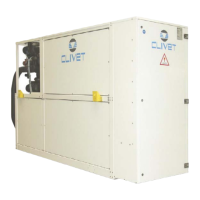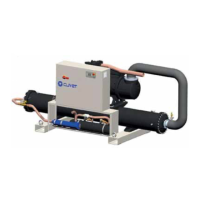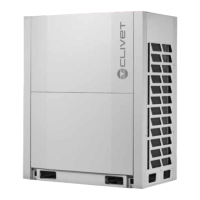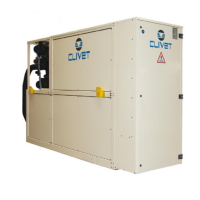M43X41C6-03 MSE-SC 65D-180F 13
A. antivibration mount
B. siphon
C. check valve
D. liquid receiver
E. solenoid valve
5.8 Checking for leaks
1 Check carefully that the evaporator unit taps are closed.
2 Connect the pressure gauges with the service ttings (on the taps or on the connection pipes).
3 Pressurise the system with nitrogen:
mode 1: up to PS (see the label) and wait few hours
mode 2: up to PS x 1,43 law (as according to UNI-EN 378-2)
CAUTION: EXPLOSION DANGER
4 Spray using a leak detector spray cocks and pipes and check if bubbles are present (gas leaks).
5 Discharge the nitrogen from the unit.
5.9 Vacuum operations
Make sure that all the service outlets are closed with proper caps; if caps are not present a leak of refrigerant can be possible.
With the cocks of the motor condenser closed, drain the system.
Using a gauge group, connect the vacuum pump on both connections of the cocks, make sure that the solenoid valve or any intermediate
cocks are open, proceed with the vacuum.
Stop the pump at a pressure of about 100 Pa and leave it under vacuum for a few hours; a slight initial rise of pressure is normal, followed by
stabilization.
If the pressure continues to rise, it means there are either small leaks or humidity is present. In the rst case, repeat the operations in the
paragraph on checking for leaks in the manual for the refrigerant pipes.
In the second case, recharge the system with refrigerant gas up to 100KPa and re-create the vacuum as described above.
Once the pressure is permanently stable, move on to the next phase, which is charging.
5.10 Refrigerant charge
Check the type of refrigerant on the serial number label
The refrigerant charge must to be completed during the start-up phase, based on the type of indoor unit and on the pipe development.
With the system under vacuum, close the cocks of the gauge group and disconnect the vacuum pump.
Connect the refrigerant gas tank, venting the air out of the hose for connection to the gauge group.
Open the cock of the liquid line.
Open the cocks of the gauge group and let liquid-state refrigerant enter using an appropriate pump.
Once charging is complete, open the gas cock so that the unit is ready to be started.
5.11 Adding oil
Consider adding oil if the connection pipes are particularly long.
Check the oil level of the compressor in the indicator or in the Schrader plug.

